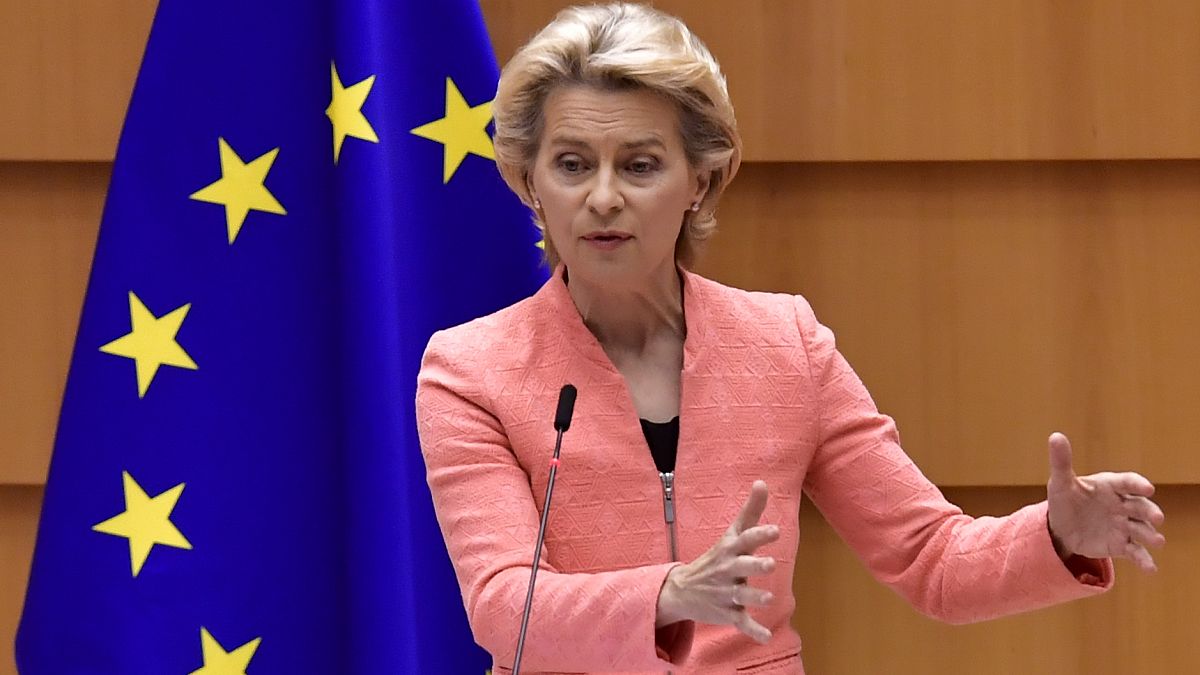The speech to MEPs setting out the Commission's priorities comes as Europe faces huge challenges including the pandemic, the economy, migration, climate change and Brexit.
EU chief Ursula von der Leyen promised a new target for cutting greenhouse emissions in Europe, delivering her first landmark State of the Union address on Wednesday.
The European Commission President said Europe must protect lives and livelihoods amid a resurgence of the coronavirus pandemic.
Outlining the Commission's priorities for the coming year, she also addressed human rights, migration, Brexit and tomorrow's technology.
See our video highlighting five key takeaways from the speech, in the player above.
Main points from von der Leyen's State of the Union address
On greenhouse emissions, von der Leyen set a reduction goal of 55% by 2030, significantly higher than the current target of 40% -- confirming earlier reports.
She promised to protect lives and livelihoods, stabilise the economy and rally the global response to the coronavirus pandemic.
The Commission president proposed building a stronger European Health Union with various measures to strengthen cross-border coordination.
Von der Leyen said there would be a new approach to migration with a "new pact", calling on member states to "step up too" and take responsibility.
The president promised a more assertive EU response to global events and not to compromise on human rights, discrimination and hate.
An EU version of the US Magnitsky Act will be put forward, enabling sanctions to be imposed on human rights abusers.
The EU will take more leadership in the digital transformation, especially on data, technology and infrastructure.
On Brexit, she had a warning for the UK over the agreed and ratified divorce agreement: "It cannot be unilaterally changed, disregarded or disciplined. This is a matter of law and trust and good faith."
Euronews Brussels correspondent Shona Murray summarises Ursula von der Leyen's speech, in the video player above.
'Opportunity' highlighted amid huge challenges
The speech came at a time when the challenges facing Europe and the European Union are enormous. The coronavirus pandemic is continuing to cause havoc across the continent, threatening a major health and economic crisis in the winter.
Von der Leyen repeatedly used the word "opportunity" when talking of the drive to tackle some of the toughest problems, such as the climate. The European Green Deal is one of the new president's flagship policies and a further reduction in emissions was duly announced.
The fire in the Moria refugee camp on the Greek island of Lesbos last week left thousands of migrants without shelter and has focused attention on Europe's responsibility towards migration.
The president promised a new migration pact, commenting that images of the camp were a "painful reminder of the need for Europe to come together", calling on EU states to accept their share of responsibility.
Far and near, the EU is facing hostile actors and foreign policy challenges: from an emboldened China and Russia to crises in the East Mediterranean and Belarus. Von der Leyen urged majority voting on the implementation of sanctions.
On Brexit, she said the UK was destroying its reputation with the Johnson government's plan to ditch part of the international treaty that sealed the divorce terms from the EU.
“Britain does not break treaties," she said, quoting from a 1975 speech from former leader Margaret Thatcher.
Reaction to von der Leyen's speech
The Commission President belongs to the European People's Party (EPP), the largest party in the European Parliament. Responding to her address, MEPs of the second-biggest grouping the Socialists and Democrats said they shared some of her goals -- on carbon neutrality, and giving the EU more competence on health and migration.
There were also calls for more EU financial clout with a stronger long-term budget -- and for funds to be linked to human rights and the rule of law.
Sophie in 't Veld of the Renew Europe group in the European Parliament said the Migration Pact was long overdue, and she awaited the details. But migrant camps like Moria should not be improved but abolished, she tweeted;
Watch Jack Parrock's report above for more political reaction to the State of the Union address.
Guy Verhofstadt of the Renew Europe group challenged von der Leyen to take her speech to the European Council, claiming that half of the issues she mentioned are blocked by the body made up primarily of national leaders.
The Greens/European Free Alliance welcomed funds pledged to fight the coronavirus pandemic and called for public money also to uphold EU values, citing alleged rule of law infringements in Hungary and Poland.
Vice-President Ska Keller said it was time for action against countries with so-called LGBTI-free zones.
Greenpeace criticised the new EU target to cut emissions by 55% by 2030, saying it "falls far short of the cuts required by science to keep global heating to 1.5°C and avoid the worst effects of the climate breakdown".
It accused the Commission of "political convenience and accounting tricks" with plans to offset emission cuts with carbon removal plans such as forest sinks, which the campaigners say have become less efficient.
Watch Ursula von der Leyen's full speech:
See below for text updates of Ursula von der Leyen's speech as it was delivered.
